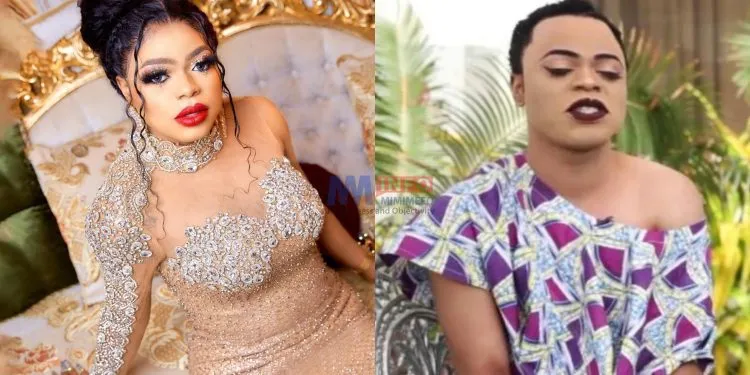The Nigeria Immigration Service (NIS) has transferred popular Nigerian cross-dresser and social media influencer, Idris Okuneye, widely known as Bobrisky, to the Force Criminal Investigation Department (FCID) Annex in Alagbon, Lagos State. This move comes after Bobrisky’s arrest while allegedly attempting to flee the country.
The arrest and subsequent transfer to FCID follow a controversial investigation into Bobrisky’s time in prison, raising questions about the privileges the cross-dresser reportedly enjoyed during incarceration. The investigation also aims to uncover potential acts of bribery that may have influenced the special treatment Bobrisky allegedly received.
Allegations of Prison Privileges
An official report from the NIS reveals that Bobrisky, sentenced to six months in prison earlier this year for violating Nigeria’s currency laws, served his time at a male correctional facility. In April, an incident led to charges against Bobrisky for “abusing the naira” by throwing banknotes at a film premiere, which violated the Central Bank of Nigeria Act.
Despite the six-month sentence, the Ministry of Interior-commissioned investigative panel found that Bobrisky allegedly benefited from a number of privileges not typically available to other prisoners. These included a private cell, complete with a humidifier, television, refrigerator, and phone access. Furthermore, the influencer reportedly received frequent visits from friends and family, sparking widespread outrage over unequal treatment in Nigeria’s prison system.
Bribery Investigations Underway
The panel investigates whether these privileges resulted from bribes paid to correctional officers. Social media activist Martins Otse, aka VeryDarkMan, alleges that bribes were offered to drop more serious money laundering charges against Bobrisky. Otse previously claimed that Bobrisky obtained special treatment by using financial means.
Last month, authorities suspended two senior prison officials amid an ongoing inquiry into bribery claims. Bobrisky has strongly denied the allegations. A viral video released shortly after his prison release in August features a voice that claims to be Bobrisky’s, stating that anti-corruption officials received $9,000 to drop the charges. Bobrisky denied that the voice belonged to him.
“I have never bribed anyone, and I did not live in a flat outside the prison as some people are claiming,” Bobrisky said in a statement via his Instagram account, where he boasts nearly five million followers. “These are baseless rumours designed to tarnish my image.”
Violation of Prison Protocols
In addition to the bribery allegations, the panel also pointed out that sending Bobrisky, a first-time offender, to a maximum-security prison may have violated the Nigerian Correctional Service Act. The law requires that first-time offenders, especially for non-violent crimes, avoid placement in maximum-security facilities.
“A clear breach of the Correctional Service Act occurred when authorities placed Bobrisky in a maximum-security prison,” stated a source close to the investigation. “We continue to investigate whether corruption or other external factors influenced her transfer to this facility.”
“Spraying” Controversy
Bobrisky faced legal trouble starting in April when a video surfaced of him “spraying” naira notes at a film premiere—a common yet illegal practice at celebrations in Nigeria. According to the Central Bank of Nigeria Act, throwing or abusing currency in this manner is punishable by up to six months in prison. While such prosecutions have historically been rare, authorities have recently cracked down on the practice as part of wider efforts to reform the country’s currency management policies.
Many viewed Bobrisky’s imprisonment as an attempt to set a high-profile example. However, the fallout from the bribery allegations has overshadowed the original case, fueling debates about the fairness of the justice system and the influence of wealth and status in Nigerian society.
As the investigation continues, all eyes remain on the FCID’s findings, which may reveal more about the deep-seated issues within Nigeria’s correctional system.
For now, Bobrisky’s legal battles are far from over, and the outcome could have significant ramifications for both the influencer and the prison authorities involved.
Public Reaction
The public’s reaction to Bobrisky’s imprisonment and subsequent investigation has been mixed. While some have expressed sympathy for the social media star, others view the case as emblematic of the disparities in Nigeria’s justice system.
“Bobrisky’s case shows how the wealthy and famous can manipulate the system while ordinary Nigerians suffer,” said Chinedu Adebayo, a Lagos-based lawyer. “It’s a clear case of double standards.”
Conversely, some of Bobrisky’s fans have rallied behind him, with several calling for transparency in the investigation. “They’re just targeting her because she’s different,” one follower commented online. “This is persecution, not justice.”



